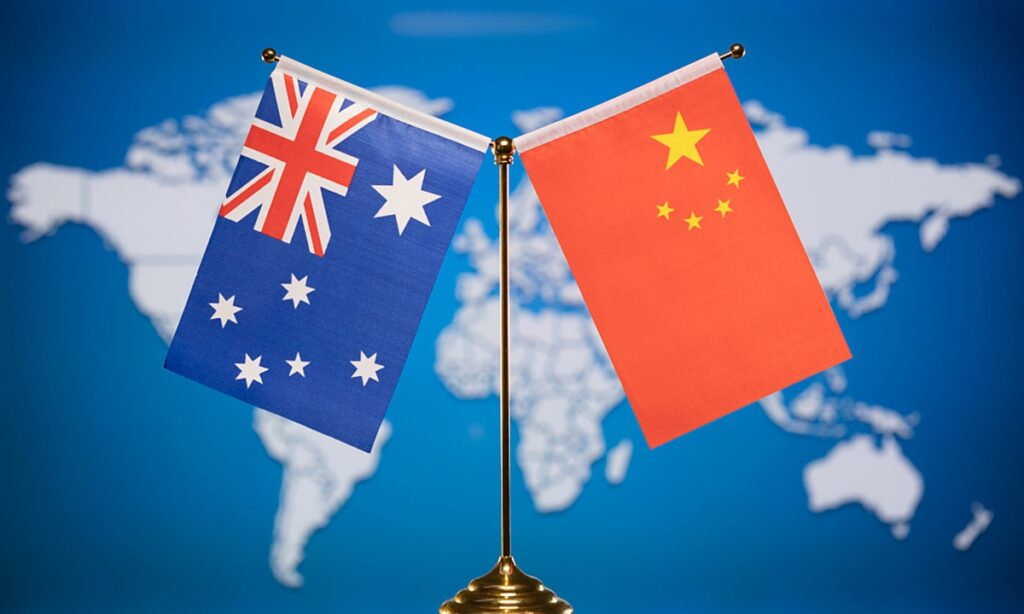China-Australia trade ministers’ meeting to support closer trade ties
China’s Minister of Commerce Wang Wentao met with Australian Trade Minister Don Farrell on Monday, noting that the two countries should create a favorable environment for business cooperation of the two countries, as bilateral relations have continued to improve with stable economic and trade cooperation under the strategic guidance of the two countries’ leaders.
Experts noted that the meeting came after a series of official exchanges between China and Australia since last year, which have shown positive significance in resolving some of the uncertainties affecting bilateral economic and trade issues and promoting the improvement of economic and trade relations.
During the meeting in Abu Dhabi, United Arab Emirates, Wang said that China-Australia ties showed strong resilience, and he hoped that Australia would to pay attention to and actively promote the resolution of specific problems encountered by Chinese enterprises in Australia, and support China’s accession to the Comprehensive and Progressive Agreement for Trans-Pacific Partnership.
China stands ready to strengthen cooperation with Australia under the WTO framework and ensure that the 13th WTO Ministerial Conference achieves pragmatic results.
Farrell said that Australia-China economic and trade relations are strong and robust, with bilateral trade and investment maintaining growth momentum in 2023. The two sides have achieved a series of positive developments in appropriately addressing each other’s economic and trade concerns.
Australia welcomes Chinese enterprises to invest in Australia and will treat investors from all countries, including those from China, in a fair and equitable manner. Australia also hopes to further expand its exports to China and push bilateral trade to a higher level, the Australian minister noted.
“The meeting marks another ministerial-level exchange following the visit of the Australian trade minister to China in May last year, playing a positive role in addressing some of the uncertainties affecting bilateral economic and trade issues. It could help to promote the improvement of China-Australia economic and trade relations,” Zhou Mi, a senior research fellow at the Chinese Academy of International Trade and Economic Cooperation, told the Global Times on Tuesday.
In terms of China’s lifting of import restrictions on Australian wine, lobster and meat, Reuters reported on Tuesday that Farrell said that a trade dispute with China over tariffs on Australian wine may be resolved “in a few weeks’ time,” adding that the two sides were close to an agreement.
Commerce Ministry spokesperson He Yadong said on February 22 that it is advancing the investigation process regarding anti-dumping and countervailing tariffs on Australian wine in accordance with the law, and will conduct a comprehensive review of the claims and evidence of all corresponding parties.
The ministry began reviewing the duties on Australian wine as of November 30, 2023. A five-year series of anti-dumping and countervailing tariffs on Australian wines was imposed on March 28, 2021.
In a letter to the Global Times earlier, Treasury Wine Estates, an Australian global winemaker, said that it is “prepared and well-placed to commence re-establishing its Australian country of origin portfolio in China should the current review into tariffs on Australian wine imports see their removal,” referring to the company’s recently announced interim results.
Experts urged the Australian side to be patient, noting that the corresponding department in China has already taken active steps over the matter. “If the conditions for the lifting of restrictions are met, the market will respond and trade will return to the normal level,” Zhou said.
In order to further properly address each other’s economic and trade concerns, the Australian side should listen to the market’s demand for bilateral cooperation and avoid adding more destabilizing factors, the expert noted.
Total bilateral trade in 2023 reached 1.61 trillion yuan ($230 billion), up 9.8 percent year-on-year, showing strong momentum and surpassing the pre-pandemic level in 2019, Chinese customs data showed.
“As China and Australia have highly complementary industrial systems, cooperation in the economic and trade areas can help to reduce uncertainties in global supply chains and provide more effective support for the global economic recovery,” Zhou said.
A healthy and stable bilateral relationship will foster cooperation in innovation, including the digital and green economies, by exploring effective mechanisms. This would enable the two countries to play a more effective role under existing regional trade agreements, offering more opportunities for the development of businesses, he noted.
(Global Times)




